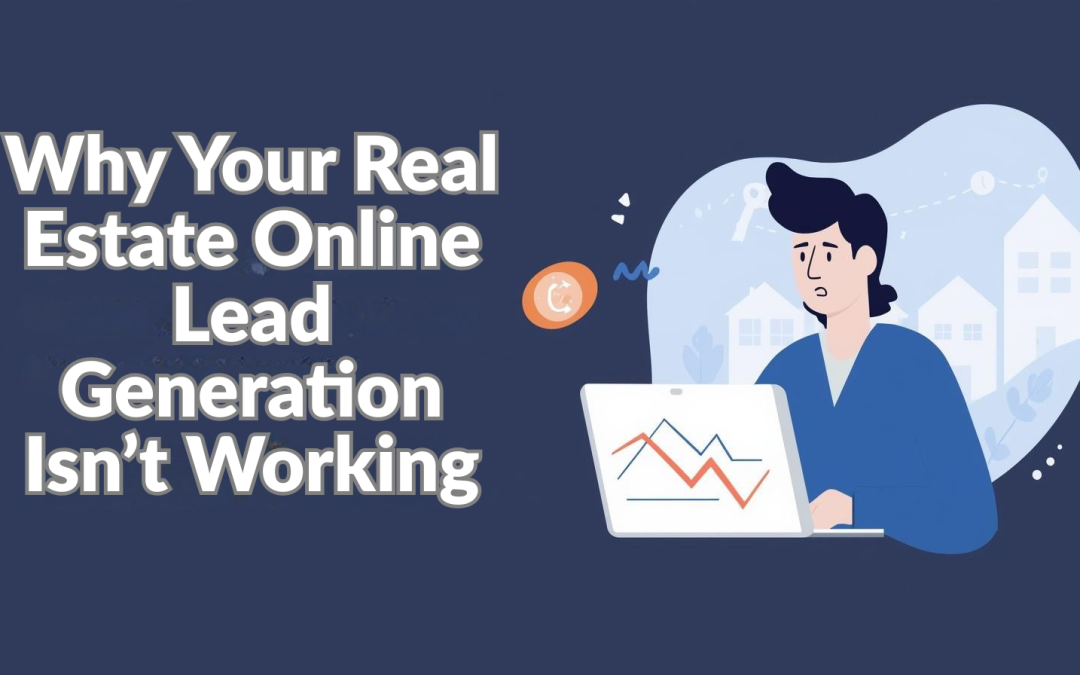Real estate professionals today are inundated with tools, tactics, and templates promising high-converting leads. But despite spending time and money, many agents and brokerages see disappointing results. So what’s going wrong? In this blog, we break down the most common reasons your real estate online lead generation might be failing—and what you can do to fix it.
1. You’re Targeting the Wrong Audience
A lot of agents kick off ad campaigns without really figuring out who they’re trying to reach. Running ads on Facebook or Google can seem super appealing when they reach a ton of people, but if those folks aren’t actually looking to buy or sell a property, it’s just throwing money down the drain. Getting specific about your target audience is super important if you want to make the most of your marketing budget.
What to Do:
- Use precise geo-targeting to reach individuals within your specific service area.
- Develop detailed buyer and seller personas based on factors like income level, expressed intent (buyer vs. seller), and lifestyle preferences.
- Continuously test different audience segments and meticulously adjust your campaigns based on their performance metrics.

2. Your Value Proposition Is Weak or Unclear
In today’s hectic market, saying “Get a Free Home Valuation” really doesn’t grab anyone’s attention anymore. If your message sounds the same as every other agent’s, your ads and landing pages are likely to get lost in the shuffle and won’t grab anyone’s attention.
What to Do:
- Craft a truly compelling and unique offer: What specific benefits or advantages do YOU provide that others don’t?
- Incorporate social proof, such as client testimonials, positive reviews, and quantifiable success statistics, to build credibility.
- Utilize benefit-focused copy that highlights the advantages for the client, rather than just listing features of your service.
3. Your Website or Landing Page Isn’t Optimized for Conversions
Even if your advertising efforts successfully drive clicks, your website or landing page might fail to convert visitors if it’s cluttered, slow to load, or confusing to navigate. First impressions are critical, and potential real estate clients are notoriously quick to abandon sites that don’t meet their expectations.
What to Do:
- Ensure your site is fully mobile-responsive and optimized for lightning-fast load times across all devices.
- Strategically place clear calls-to-action (CTAs) prominently above the fold, making it easy for users to take the next step.
- Include essential trust signals, such as agent license numbers, client reviews, and evidence of recent successful sales, to build confidence.
4. You’re Ignoring Lead Nurturing
It’s quite rare for real estate leads to convert into clients immediately. If you’re not staying in touch with potential clients using tools like email automation, drip campaigns, or retargeting ads, you could be losing out on some serious cash. Keeping in touch with these leads is super important.
What to Do:
- Set up automated email sequences designed to keep your brand top-of-mind and provide ongoing value.
- Implement retargeting campaigns to re-engage website visitors with relevant and helpful content, not just repetitive ads.
- Consistently offer tangible value, such as downloadable market reports, comprehensive first-time buyer guides, or exclusive neighborhood insights.
5. Your Lead Capture Forms Are Too Aggressive
Asking for personal stuff like a phone number too soon can make people feel uneasy and might turn them off from connecting. Many prospects are hesitant to share personal details until they feel a level of trust. If your forms come off as too pushy, you might really hurt your chances of turning leads into customers.
What to Do:
- Start with a simple request, typically just a name and email address, to lower the initial barrier to entry.
- Employ progressive profiling techniques to gradually collect more information from leads over time as they engage further.
- Offer valuable lead magnets, such as downloadable guides, curated local property listings, or exclusive webinar access, in exchange for contact information.
6. You’re Relying Too Much on Paid Ads
Using paid ads is definitely a great way to get leads, but if you depend only on that, your business might be at risk. True marketing success involves a diversified approach that includes various channels. By doing this, you can better navigate challenges and expand your reach to a broader audience.
What to Do:
- Invest strategically in Search Engine Optimization (SEO) to improve your real estate website’s organic visibility.
- Develop a robust content strategy that focuses on local real estate trends, market insights, and community information.
- Make sure to really optimize your Google Business Profile so you can stand out in local searches and draw in people who are nearby.

7. You Don’t Have a Clear Follow-Up System
In the fast-paced world of real estate, if a lead doesn’t receive a response within the first 5–10 minutes, they are highly likely to move on to the next available agent. Delayed or absent follow-up means you are actively losing potential clients and revenue.
What to Do:
- Set up a CRM system that sends instant alerts for new leads, so you can jump on responses quickly.
- Kick things off by sending quick emails or texts to let leads know you’ve got their inquiry. This way, you can acknowledge them right away and set some expectations.
- Set up a regular routine for daily follow-ups, or pass this important job off to a specific assistant or team member.
8. You’re Not Tracking or Adjusting
Do you know your precise cost per lead? What is your conversion rate from a lead to a closed client? If you don’t have this important info, you’re basically in the dark and won’t be able to spot where to make things better or get the most out of your marketing budget.
What to Do:
- Make the most of handy tools like Google Analytics, the Facebook Pixel, or your CRM’s reporting features to get valuable insights.
- Conduct A/B split-testing on your ads, landing pages, and offers to determine what resonates best with your audience.
- Review your performance data on a weekly basis and make data-driven adjustments to your overall strategy.
Final Thoughts: Your Leads Aren’t Broken—Your Strategy Might Be
The real estate market is more competitive than ever before. If your online lead generation isn’t bringing in the results you want, don’t worry—these problems can definitely be sorted out. If you focus on reaching the right people, sprucing up your offers, setting up solid follow-up processes, and always testing new ideas, you’ll really boost your chances of turning online clicks into real property deals.
Next Steps:
Start by taking a good look at your existing lead generation funnel. Identify precisely where potential leads are dropping off and which of the 8 areas discussed above require the most immediate attention. Focus your efforts on these critical points first to build a strong and effective foundation for your lead generation success.
